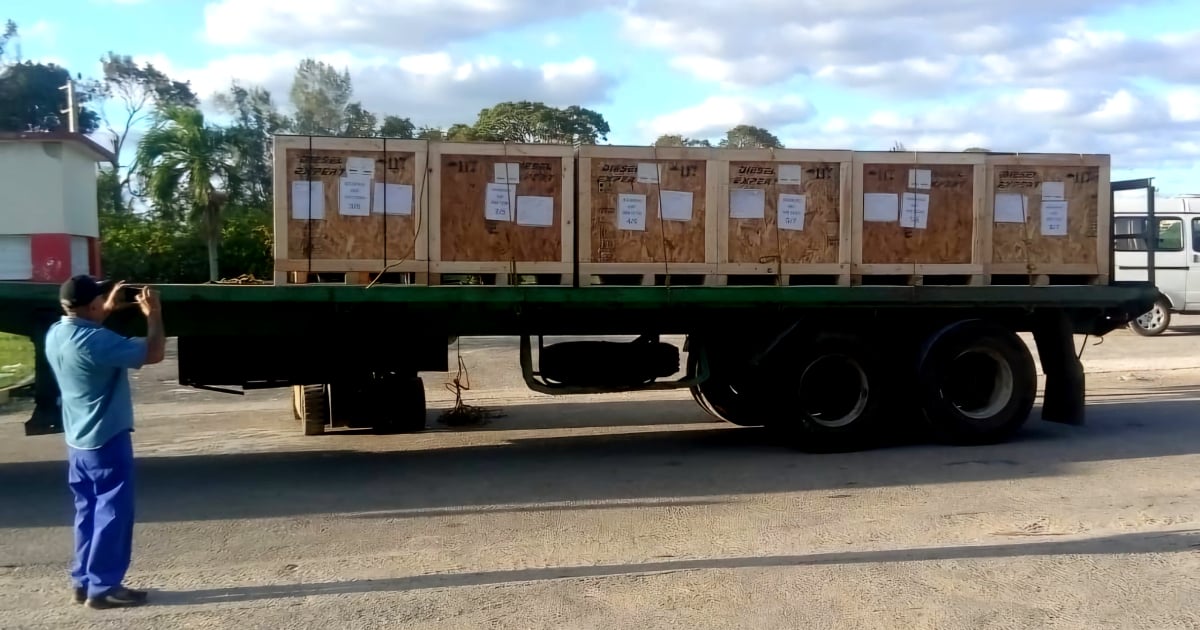The Cuban government has recently announced the arrival of replacement parts for generators purchased during Fidel Castro's era, intended for what the self-styled commander called the "energy revolution." The Minister of Energy and Mines, Vicente de la O Levy, delivered this "hopeful" message to the victims of his administration's poor performance, yet failed to disclose the origin of the shipment or explain how these parts supposedly arrived despite the "blockade" the regime blames for its difficulties.
"Replacement parts have begun to arrive for the recovery of distributed generation groups, as part of the program to restore the generation capacities of the Electrical System," stated the MINEM head on social media this Tuesday. His post implies that the administration of Miguel Díaz-Canel is implementing another "strategy" to restore the national electro-energy system, which involves repairing the malfunctioning equipment of over 1,400 fuel and diesel generators installed between 2005 and 2009.
The Past Promises of Energy Solutions
This is not the first time the Cuban regime has promoted the idea of reviving the equipment Castro had hoped would combat the energy crisis following Russia's hydrocarbon supply cut-off. The emergence of Hugo Chávez facilitated the so-called "energy revolution" by the dictator, who deemed it reasonable to let Soviet-technology thermoelectric plants deteriorate while funneling investments into purchasing generators powered by Venezuelan-subsidized oil.
In November 2022, Arles Luna Leiva, Director of Distributed Generation of the Cuban Electric Union (UNE), told Cubadebate that 944 diesel groups spread across 154 plants and 507 fuel groups distributed in 35 plants were meant to provide the system with approximately 2,606 MW. However, data from that year showed 366 groups (680 MW) were out of service due to a lack of spare parts, and another 150 groups (282 MW) awaited maintenance, resulting in a 962 MW deficit.
Unanswered Questions and Skeptical Public
The exact number of generators currently out of commission or awaiting parts for maintenance remains unknown. The UNE reported that as of Tuesday, 48 out of 189 distributed generation centers were out of operation due to fuel shortages, creating a 229 MW deficit. Despite this, the MINEM head celebrated the arrival of replacement parts, though he offered no supporting figures for his optimism.
"A chain of actions is planned to increase available power in Distributed Generation by 207 MW by the end of December 2022," Luna Leiva stated, adding that by 2023, the power available should increase by 1,000 MW compared to the previous year. However, the strategy failed or was merely another false promise from the Cuban regime, which now, through De la O Levy, continues the narrative of distributed generation.
Many Cubans took to social media to question the minister about why these steps weren't taken sooner and why they should believe his current assurances. With over 6,000 megawatts of installed capacity for energy generation, the country needs to recover its entire distributed generation fleet to achieve 21.7% generation with fueloil engines and 21.9% with diesel engines.
Environmental and Financial Concerns
Beyond the undisclosed investment required, many experts criticize this approach due to its significant financial and environmental costs. Aware of these criticisms, the regime has been promoting a new strategy focused on transitioning to renewable energy sources, promising everything from a minute of clean energy for the coming year to the installation of 2,000 MW of solar power by 2026.
Amidst these grand promises, Vicente de la O Levy announced that, defying the "blockade," replacement parts for the generators have arrived in Cuba. This move highlights the regime's urgency and short-term investment preference, rather than undertaking the necessary reforms and investments to restore the national electrical system, alter the country's energy matrix, and provide stability to UNE's customers, who have faced constant challenges since Castro's so-called energy revolution.
Origin of the Replacement Parts Revealed
In his tweet, De la O Levy shared images of large boxes labeled with Diesel Expert. A quick internet search identifies Diesel Expert as a subsidiary of Groupe Chalifour, a family-owned business with over 50 years in the energy industry, headquartered in Quebec, Canada, and present in Paris.
Diesel Expert specializes in providing high-quality solutions for thermal power plant operators and propulsion engines. Their services include supplying certified spare parts for centrifuges from brands like Alfa Laval, Mitsubishi, and Westfalia, as well as OEM components for medium and large capacity diesel engines. They also refurbish cylinder heads, valve bodies, piston crowns, and cylinder liners. Their mission is to deliver quality services and products that support their clients' operations, positioning themselves as a reliable partner in engine and auxiliary equipment maintenance.
And once again, the familiar question arises among Cubans: "What about the blockade?"
